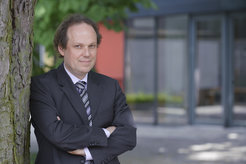A Network for Researching the Anthropocene
Interview with Jürgen Renn discussing the institute's concept, the phenomenon of the "Great Acceleration," and the significance of the MPI's location in Jena.
Interview: Constanze Steinhauser

Understanding the interrelationships between the geosphere and man-made systems is the scientific focus of the Max Planck Institute of Geoanthropology. The Institute in Jena brings together research areas that are represented in all three scientific sections of the Max Planck Society. Corresponding inter- and transdisciplinary research projects concern, for example, planetary urbanization, the global food system and global material, energy and information flows. The concept for the scientific reorientation of the former MPI for the Science of Human History was largely developed by Jürgen Renn, who now heads the Institute as Director together with Ricarda Winkelmann.
Mr. Renn, what does your concept for the Max Planck Institute of Geoanthropology entail?
The Institute will work on a highly interdisciplinary basis and contribute to the establishment of geoanthropology as a new transdisciplinary subject. Geoanthropology attempts to understand the effects of human intervention and the man-made technosphere on the natural Earth system. The earth system has now become a coupled human-earth system whose dynamics are still largely not understood. To this end, geoanthropology draws on findings from the earth system, life, social and behavioral sciences and brings them together with a historical perspective that encompasses the history of the earth and humanity.
The technosphere? What does that mean?
The Homo sapiens species, which for a long time was only a tiny part of the biosphere, has suddenly become a determining factor in the material and energy cycles of the Earth system. At the turn of the millennium, Nobel Prize winner and Max Planck Director Paul Crutzen, who died in 2021, coined the term Anthropocene, i.e. the human age. Since the beginning of human history, humans have triggered far-reaching environmental changes through the use of technical means such as controlled fires, hunting tools, and later agriculture and animal husbandry. These techniques have imposed a whole new dynamic on the history of the earth. Over thousands of years, they have led to the gradual formation of a new sphere of the earth system, which we call the technosphere. The characteristic periods of change in the technosphere are particularly short and also influence those of the other earth spheres.
That sounds exciting and worrying at the same time.
And it is. Since the middle of the 20th century at the latest, we have been observing dramatic changes in many key parameters of the Earth system, and how these are happening ever faster. These include, for example, the proportion of greenhouse gases in the atmosphere, the acidification of the oceans, the loss of biodiversity, but also the parameters of global society. All of these different parameters show almost exponential growth - an indication that we are dealing with a coupled global system. The term Great Acceleration has become established for this. Understanding this coupling is the actual aim of the new institute. After all, unlimited growth can only lead to collapse in the long term. We must therefore find intervention points that are suitable for bending the growth curves of the Great Acceleration downwards.
Is that one of your research goals?
Yes, but the social control of such highly complex processes is a completely different - and important - question. The Institute's contributions to this will primarily be findings about interrelationships that can help us to change certain feedback loops. The Institute's particular perspective is focused on systemic dynamics, because only if these are taken into account can the dangers of one-sided measures be prevented.
What do you mean?
Let me give you an example: Let's take the discussion about biodiesel. The promotion of ostensibly sustainable, because renewable, fuels from biomass has led to a completely different form of land use - from the Uckermark to Brazil - and has had a direct impact on food production, the spread of monocultures and the associated loss of biodiversity. These are all interactions that take place in a coupled system. It must therefore be the Institute's task never to lose sight of such complex interrelationships.
How does the MPI of Geoanthropology differ from other institutes?
It is the first institute to belong to all three sections of the MPG. The MPI will not only be transdisciplinary, but will also work internally across departmental boundaries on projects, for example on understanding the aforementioned "Great Acceleration". Within the MPG and beyond, it will act as a kind of node in a network in which ideas, data and researchers are brought together worldwide in order to understand this global problem. It is unique in this form.
What spoke in favor of Jena as a location?
Our concept is an excellent link to the two existing Max Planck Institutes in Jena with an ecological focus and to the Friedrich Schiller University, but there are also opportunities for cooperation with the recently founded Senckenberg Institute for Plant Diversity. There are also opportunities for cooperation with other institutions such as the Carl Zeiss Foundation, which, like the state of Thuringia, is committed to supporting the reorientation.
Translated with DeepL.com (free version)












